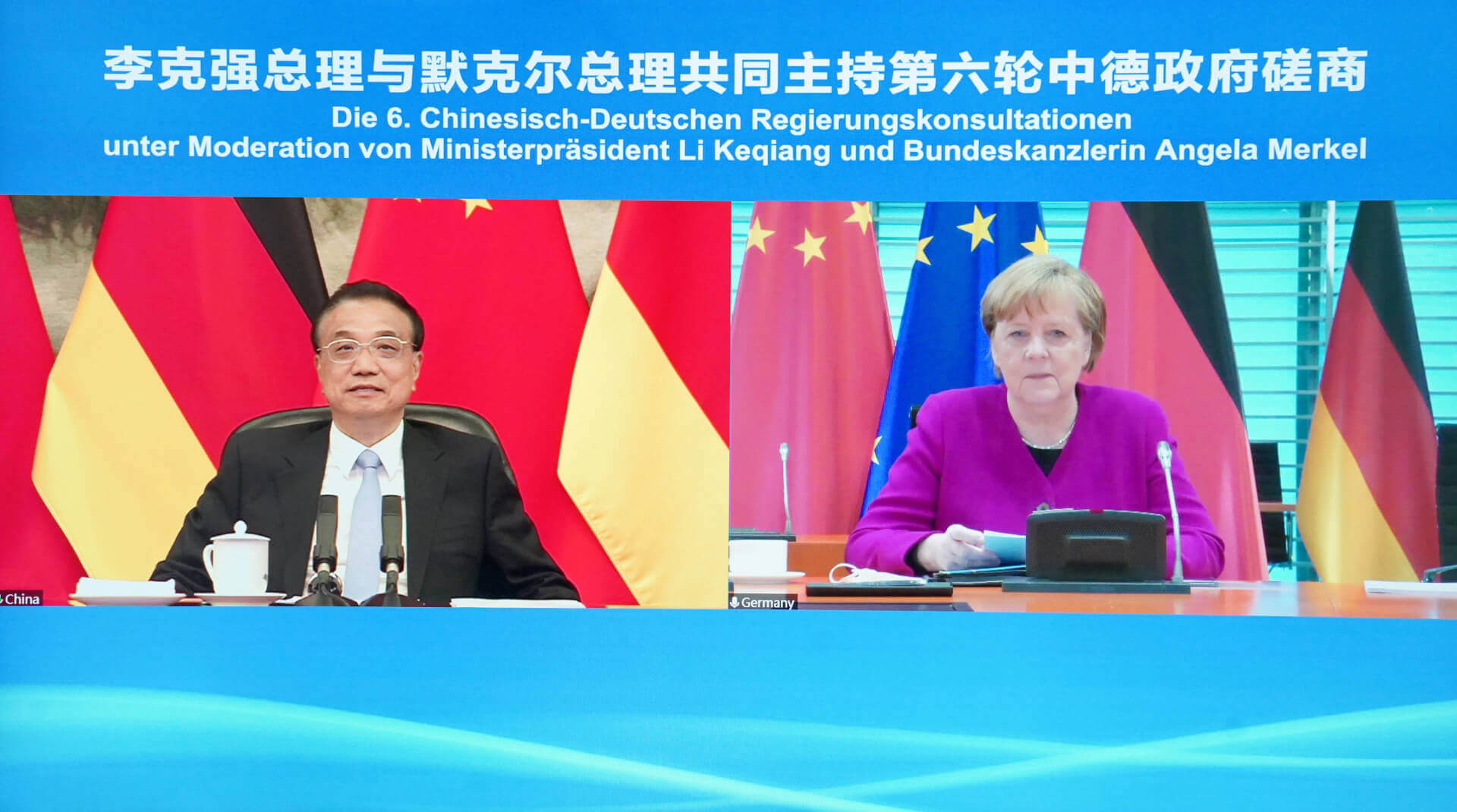Germany
Premier Li Keqiang virtually co-hosted the 6th round of China-Germany intergovernmental consultations with German Chancellor Angela Merkel on Wednesday. Both leaders reviewed work reports from 25 departments of the two countries, including foreign affairs, economy and trade, judiciary, finance, industry, transportation, education, science and technology, health, agriculture, environmental protection, and social security.
In Germany, a parliamentary committee is scheduled to hold a public hearing on “human rights violations against the Uyghurs” on May 17. Referring to this, Li urged Germany to focus on its trade ties with China, and not the human rights situation in the country. “It is a fact that China and Germany have differences of opinion on some issues, but my opinion is that as long as both sides respect each other’s core interests and important concerns, as long as we communicate on the basis of equal treatment and mutual non-interference in each other’s internal affairs ... reduce differences and focus on cooperation, then we can create favourable conditions for smooth dialogues and cooperation.”
Meanwhile, Merkel said that cooperation between both sides on diplomacy, trade, agriculture, food, security, sustainable development, and climate has been greatly deepened thanks to the intergovernmental consultation mechanism, and expressed hope that the mechanism could be continued.
Chad
Also on Wednesday, President Xi Jinping sent a message of condolence to the head of Chad’s transitional military council, Mahamat Idriss Déby, over the death of Chadian President Idriss Déby Itno.
Xi said that President Déby was an important figurehead who “led the Chadian people to safeguard the national sovereign security and territorial integrity” and who had made important contributions to promoting the development of friendly and cooperative relations between China and Chad.
Joint Conference on COVID-19 Response
On Tuesday, State Councilor and Foreign Minister Wang Yi hosted a joint video conference with officials from Afghanistan, Bangladesh, Nepal, Pakistan, and Sri Lanka on COVID-19. The conference was attended by Afghan acting Foreign Minister Mohammed Haneef Atmar, Pakistani Foreign Minister Shah Mahmood Qureshi, Nepali Foreign Minister Pradeep Kumar Gyawali, Sri Lankan Foreign Minister Dinesh Gunawardena, and Bangladeshi Foreign Minister A.K. Abdul Momen.
The leaders released a joint statement following the meeting that reiterated the group’s “firm support to WHO’s role in the global cooperation against COVID-19 and acknowledged that tracing the origin of the virus is a matter of science and a global mission.” The ministers also expressed their opposition to politicising the issue and pledged that they would “strengthen cooperation to track COVID-19 mutation closely.”
They also agreed that vaccines are the “key weapon to defeat COVID-19, should be distributed in accordance with the principle of equity and justice” and that vaccine nationalism would “hinder the global efforts to defeat COVID-19.”
Laos
On Sunday, President Xi Jinping exchanged congratulatory messages with the General Secretary of the Lao People’s Revolutionary Party Central Committee and Lao President Thongloun Sisoulith on the 60th anniversary of the establishment of diplomatic ties between the two countries.
During the meeting, Xi said, “I attach great importance to the development of China-Laos bilateral relations, and stand ready to work with General Secretary Thongloun to implement the action plan on the China-Laos community with a shared future as the mainline, promote high-level exchanges, strengthen strategic communication, deepen practical cooperation, and consistently promote the building of such a community in the next 60 years so that the people of the two countries can forever be good neighbours, good friends, good comrades, and good partners.”
Thongloun responded by saying “Laos-China relations are at their best in history, and Laos is ready to deepen its comprehensive strategic cooperation with China, expand friendly exchanges in various fields and promote sustainable development in building the Laos-China community with a shared future.”
Council on Foreign Relations (United States)
On Friday, State Councilor and Foreign Minister Wang Yi held a virtual dialogue with the United States (US) Council on Foreign Relations (CFR), which was attended by 500 American delegates.
Wang said that “the new administration of the United States, in shaping its China policy, has not stepped out of the shadow of the previous administration, has not got over its misperception of China, and has not found the right way to engage with China.”
Wang also expressed hope that the United States will “view China’s development in an objective and rational way,” “work with China to explore a new path of peaceful co-existence and mutually beneficial cooperation,” “practice true multilateralism,” and “not interfere in China’s internal affairs”. He also added that “playing the “Taiwan card” is dangerous, like playing with fire” and that “Xinjiang-related issues are not about human rights, ethnicity or religion,” but rather about “fighting violent terrorism, separatism, and extremism.”
Chinese Diplomacy: Weekly Round-Up (23 - 30 April, 2021)
This week, Chinese diplomats held meetings with officials from Laos, Chad, Germany, Afghanistan, Pakistan, Nepal, Sri Lanka, and more.
April 30, 2021

SOURCE: FMPRC
